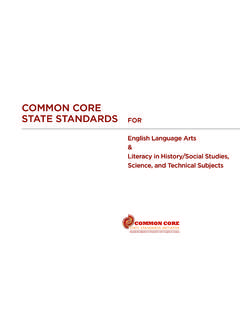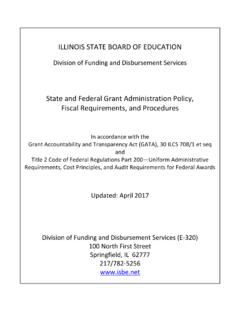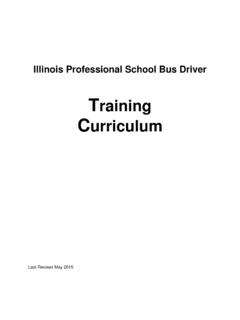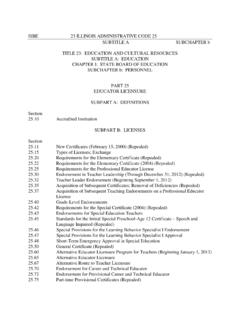Transcription of Illinois Educational Opportunities for Military …
1 Updated 3/28/2014 1 Illinois Educational Opportunities for Military Children Council Frequently Asked Questions Illinois Public Education System Military Compact Information 1) Is Illinois a member of the Military Interstate Children s Compact Commission (MIC3)? Yes, Illinois joined the Military Interstate Children s Compact Commission in 2010 upon the adoption of Public Act 96-953. 2) What is the purpose of the Compact in Illinois ? a) The purpose of Illinois Compact is to remove barriers to Educational success imposed on children of Military families because of frequent moves and deployment of their parents by: b) Facilitating the timely enrollment of children of Military families and ensuring that they are not placed at a disadvantage due to difficulty in the transfer of education records from the previous school district; c) Facilitating the student placement process through which children of Military families are not disadvantaged by variations in attendance requirements, scheduling, sequencing, or assessment; d) Facilitating the qualification and eligibility for enrollment and education programs; e) Facilitating the on-time graduation of children of Military families; and f) Promoting flexibility and cooperation between the education system, parents, and the student in order to achieve Educational success for the student.
2 (105 ILCS 70/5). 3) Who is covered by the Military Interstate Children s Compact Commission (MIC3)? The Compact applies to the children of: a) active duty members of the uniformed services as defined in the Compact, including members of the National Guard and Reserve on active duty orders pursuant to 10 Section 1209 and 1211; b) members or veterans of the uniformed services who are severely injured and medically discharged or retired for a period of one (1) year after medical discharge or retirement; and Updated 3/28/2014 2 c) members of the uniformed services who die on active duty or as a result of injuries sustained on active duty for a period of one (1) year after death. The provisions of the interstate Compact shall only apply to local education agencies as defined in the Compact. The provisions of this compact shall not apply to the children of: a. inactive members of the national guard and Military reserves; b. members of the uniformed services now retired, except as provided in Section A; c.
3 Veterans of the uniformed services, except as provided in Section A; an d. other Dept. of Defense personnel and other federal agency civilian and contract employees not defined as active duty members of the uniformed services. (105 ILCS 70/20). 4) What terminology should I be aware of in regards to the Compact? Children of Military families means school aged children, enrolled in kindergarten through twelfth grade, in the household of an active duty member. Active duty means active duty members of the uniformed Military services, including any of the following: (1) Members of the National Guard and Reserve that are on active duty pursuant to 10 1209 and 10 (2) Members or veterans of the uniformed services who are severely injured and medically discharged or retired for a period of one year after medical discharge or retirement. (3) Members of the uniformed services who die on active duty for a period of one year after death. "Non-custodial parent" means a person who has temporary custody of the child of active duty Military personnel and who is responsible for making decisions for that child.
4 Sending state means the state from which a child of a Military family is sent, brought or caused to be sent or brought. Receiving state means the state to which a child of a Military family is sent, brought or caused to be sent or brought. Updated 3/28/2014 3 5) What is the difference between the IL Educational Opportunities for Military Children Council (IEOMCC) and MIC3? The Military Interstate Children s Compact Commission is a federal initiative to support the transitions of children from Military families. Forty-three states have signed on to the Compact to date. More information is available about the Compact at The Illinois Education Opportunities for Military Children Council (IEOMCC) is a state body created in statute to identify challenges encountered during the transfer of Military students as well as strategies for enhancing the Educational transitions of Military children enrolling in Illinois schools. This group is under the oversight of the Illinois P-20 Council and is chaired by Illinois MIC3 Commissioner (representative).
5 IEOMCC has representation from Illinois Military installations, school districts with the largest proportions of Military children, the P-20 Council, the Governor s Office, Lieutenant Governor s Office, Illinois State Board of Education, and the Illinois Department of Veterans Affairs. More information is available about IEOMCC at: Preparing for Transfer 6) How do I know what documents & records are needed for a successful transfer of my student? The Illinois Educational Opportunities for Military Children Council has developed a tool kit to assist you in preparing the necessary documentation for ensuring a smooth transition . Commonly requested records include student transcripts, documentation of health, dental, and eye exams, record of immunizations, individualized learning plans as necessary. The guidance in the tool kit includes a checklist featuring helpful hints as well as key contacts and resources. The tool kit is available at: 7) My student s transcript has not yet arrived from her/his previous school.
6 May my student enroll in school? Until June 30, 2015, out-of-state transfer students, including children of Military personnel that transfer into this State, may use unofficial transcripts for admission to a school until official transcripts are obtained from his/her last school district. No school may refuse to admit or enroll a student because of student's failure to present his/her permanent or temporary student record from a previously attended school. (105 ILCS 10 ). Updated 3/28/2014 4 8) Can a transfer student be charged tuition? If a student who is a child of active duty Military personnel is (i) placed with a non-custodial parent (person who has temporary custody and makes decisions for the child) and (ii) as a result of placement, must attend a non-resident school district, then the student must not be charged the tuition of the school that the student attends as a result of the placement and must be counted in the calculation of average daily attendance.
7 (105 ILCS 70/25). 9) I am transferring from a district in Illinois , how long can does it take for transcripts to be sent to my new district? When a new student applies for admission to a school and does not present his school student record, the receiving school may request records from student s previous school or district. Requests for student records shall be honored within 10 days. (105 ILCS 10 (b)). 10) What is the timeline for acquiring proof of immunizations for new students to the state of Illinois ? Every child enrolling in an Illinois school must provide proof that she/he has been vaccinated against preventable, communicable diseases prior to October 15 of that school year or the date established by a local district. Through June 30, 2015, students transferring from out of state who are unable to provide proof of immunizations by the appropriate date, she/he may attend classes if she/he is able to provide documentation of a scheduled appointment.
8 If the child is unable to obtain the necessary immunizations by October 15 or the date established by the local district, you may be granted an extension from the local district by obtaining proof that an appointment has been scheduled along with a letter stating the reason for the delay from your health care provider. Parents or legal guardians may opt out of the exam on religious grounds by submitting a written statement indicating this preference in which case the student will not be required to receive an exam. (105 ILCS 5 ). 11) What documentation must be provided if the parent is not present to enroll the Military dependent child? Active Military duty personnel who must place the student with a non-custodial parent may submit a special power of attorney to the school district that authorizes the student (i) to enroll in the district of the non-custodial parent and (ii) have decisions made by the non-custodial parent. If a special power Updated 3/28/2014 5 attorney created in this section is filed with the school district, then the school district must follow the direction of the special power of attorney.
9 (105 ILCS 70/30). 12) If a student is transferring from a Department of Defense (DOD) school, how will student records be sent? Additional information on transferring from a DOD school can be found on the DoDEA website at ). A form requesting the release of student records to the receiving school is available online at 13) Can a transitioning Military child continue enrollment in their home school even if they are placed in the care of a guardian who lives outside of the home school jurisdiction? A student who must attend a non-resident school district due to placement with a non-custodial parent must not be charged tuition. (105 ILCS 70/25). Continuity of Experience and Services 14) What is the procedure for allowing a student to enter kindergarten and/or 1st grade in Illinois if the sending state has a different entrance age requirement? To begin kindergarten in the state of Illinois , a child should be 5 years old on or before September 1 of the kindergarten year and live within the boundaries of the school district.
10 If a child does not meet these requirements but has previously enrolled and attended kindergarten, families are encouraged to work with the receiving district to identify the best approach. (105 ILCS 5 ). 15) What does a school need to do to facilitate on time graduation for transferring Military children? Receiving district may work with transfer student to determine an appropriate schedule to ensure student graduates provided that the student has met district s minimal graduation requirements which may be modified to accommodate scheduling conflicts but not student s academic failure. If a student transfers during his/her senior year and the receiving district cannot make reasonable adjustments to ensure graduation, then the district shall make every reasonable effort to ensure student receives diploma from sending district. (105 ILCS 70/35). Updated 3/28/2014 6 16) What is the process for a student to access special education services?
















